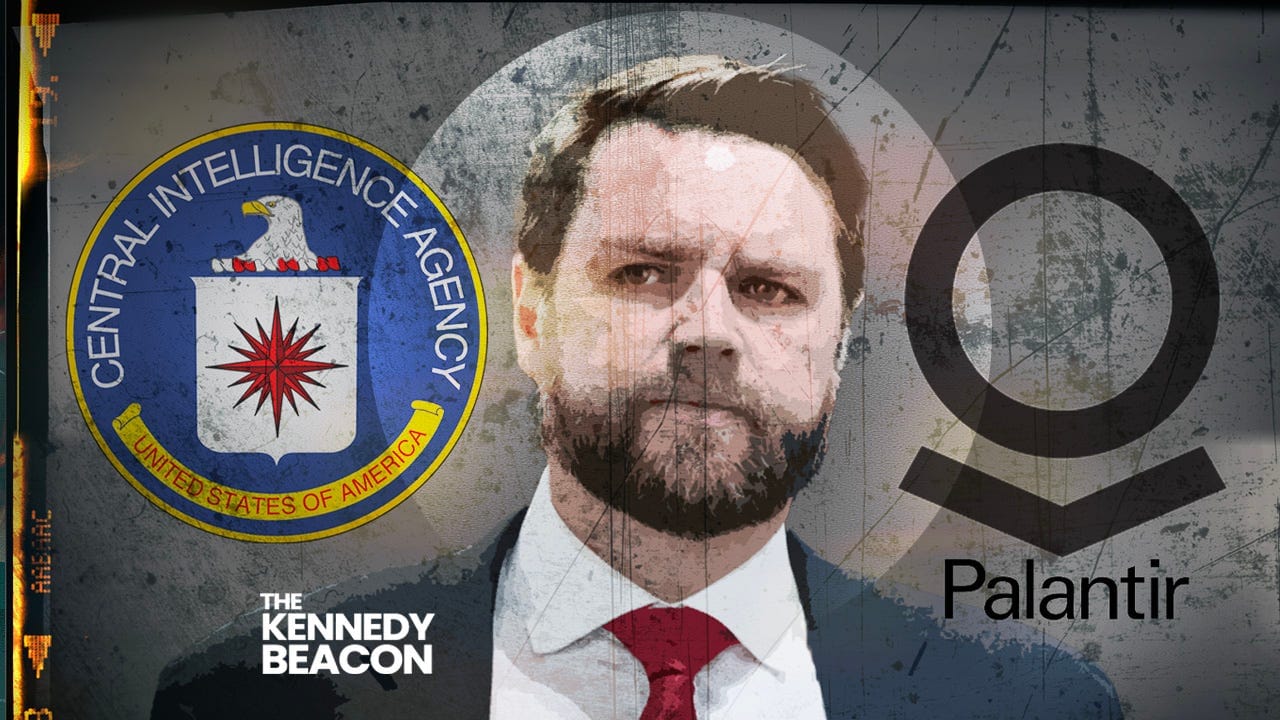Originally published by The Kennedy Beacon
Just two days after surviving an attempt on his life, former president Donald Trump announced Senator J. D. Vance of Ohio as his running mate in the increasingly heated 2024 presidential election.
While some are celebrating Vance as a promising move toward a populist-friendly Republican ticket, independent presidential candidate Robert F. Kennedy Jr. described Vance’s nomination as “a salute to the CIA and to the intelligence community and to the military industrial complex.” Similarly, investigative journalist Whitney Webb has drawn attention to Vance’s ties to a government contractor called Palantir Technologies, which she frames as a CIA cutout in her reporting for Unlimited Hangout.
But what exactly is Palantir, who’s behind it, and what does this have to do with Vance and the election?
Palantir and Peter Thiel
Palantir Technologies is a software company founded by Vance’s primary financier, Peter Thiel, in 2003 in the wake of the attacks of September 11, 2001. Palantir provides big data analytics platforms for various government agencies in the name of national security.
Thiel is a long-standing member of the Silicon Valley elite and, more specifically, of the so-called PayPal Mafia. He was the first outside investor in Facebook, remaining on the company’s board until 2022, per CNBC’s reporting. According to Fortune, he gave a record-breaking $15 million to Vance’s 2022 senatorial campaign, which Politico describes as “the largest amount ever given to boost a single Senate candidate.”
As explained by Business Insider, Thiel named his company “Palantir” after the all-powerful seeing stone featured in the Lord of the Rings series. To Webb, the name is highly significant, given the company’s capabilities. Although it operates as a private corporation, Palantir’s offerings are nearly indistinguishable from prior mass surveillance programs run by American intelligence agencies.
As summarized by researcher James Corbett in October 2022, Palantir “knows everything about everyone.” It is a “company that can combine pictures of you with your cell phone location data, emails you’ve written, your health records and credit card purchases and thousands of other pieces of electronic data … a company that can target you anywhere in the world at any time.”
Palantir’s relationship with US intelligence agencies need not be left to speculation. A major Palantir investor is In-Q-Tel, the CIA’s venture capital arm, and as noted by Vice, the company is a contractor for the CIA, NSA, and Department of Homeland Security. Avril Haines, director of national intelligence and former CIA deputy director, served as a Palantir consultant (a relationship quietly wiped from her biography when she joined the Biden campaign, as reported by The Intercept).
More specifically, Palantir’s big data analytics system bears a striking resemblance to a government program called Total Information Awareness (TIA), which the American Civil Liberties Union previously described as “the closest thing to a true ‘Big Brother’ program that has ever been seriously contemplated in the United States.”

Run by the Defense Advanced Research Projects Agency (DARPA), the goal of TIA was to create an “ultra-large-scale” database containing as much information as possible on as many people as possible. DARPA was simultaneously developing a project called LifeLog, which Wired describes as “an ambitious effort to build a database tracking a person’s entire existence.”
LifeLog was unceremoniously canceled by the Pentagon, according to Military.com, on February 4, 2004 – the exact same day, as Time reminds us, that Facebook first went online. In another such coincidence, TIA was renamed in May 2003 (the month Thiel incorporated Palantir) and formally shuttered shortly thereafter.
But as Webb emphasizes, TIA never really went away. In 2006, MIT Technology Review reported on the NSA’s warrantless eavesdropping of individuals’ phone calls and emails, using the specific framework developed under TIA. In a July 27 video report, James Corbett highlights early criticisms of TIA from reporter Glenn Greenwald (who in 2013 helped whistle-blower Edward Snowden expose the extent of the NSA’s illegal surveillance program).
What About Vance?
Concerns over Thiel and Palantir noted, the question remains whether these should also be applied to Vance. Is the troublesome connection to America’s intelligence apparatus incidental, or direct?
In Webb’s estimation, the odds of Vance following through on his populist proclamations are slim to none. “JD Vance owes his entire career to Peter Thiel, who helped create the domestic terror panopticon for the CIA that targets Trump supporters and detractors alike,” wrote Webb on X on July 18. Webb posits that the interests of Vance, as a Thiel protégé, will almost certainly fall in line with those of Thiel.
First approached by Thiel while attending Yale Law School, Vance later joined Thiel’s Mithril Capital as a principal. Palantir is among the companies in Mithril’s portfolio.
In 2017, Vance joined Revolution LLC, a venture capital firm established by AOL founder Steve Case, with whom Vance co-led Revolution’s Rise of the Rest (ROTR) seed fund. ROTR is funded by investments from, among others, Amazon founder Jeff Bezos; Michael Milken, who was indicted in 1989 on securities fraud charges and pardoned by Trump in 2020; Sean Parker, Facebook’s first president, who introduced Thiel to Mark Zuckerberg; and Google co-founder Eric Schmidt.

Notably, ROTR’s portfolio under Vance’s leadership included Anduril Industries, a defense contractor hired in 2020 by the Trump administration to build a “smart wall” along the US-Mexico border. As reported by The Washington Post, the system uses thermal imaging and artificial intelligence to detect illegal crossers and report them to Customs and Border Patrol agents for capture. But the “smart wall” also integrates biometric surveillance of legal border crossers, with facial recognition identifying and logging those entering and leaving the United States (Americans and visitors alike) into a database. As explained by Trucha, this “smart wall” is an “ineffective and costly measure that, while more sophisticated than previous ones, is ultimately much more intrusive, way less transparent, and extremely inaccurate.” Another Anduril investor is Thrive Capital, which is run by the brother of Trump’s son-in-law Jared Kushner and, as reported by The New York Times, also backed by Thiel. Revolution’s broader portfolio also includes CLEAR, a digital identity company that uses biometrics to track people at airport security checkpoints and, during the COVID-19 era, to conduct screenings using its proprietary “Health Pass.”
Just prior to the declaration of the COVID-19 pandemic, Vance co-founded Narya Capital with funding from Thiel and Eric Schmidt, as reported by TechCrunch. In May 2021, Narya and Thiel announced a large co-investment in video platform Rumble. Ostensibly a free-speech alternative to YouTube (a subsidiary of Google, where Schmidt was previously CEO), Rumble has quickly become the go-to for those censored by the video streaming giant.
Thus, a cursory review of Vance’s career as a venture capitalist reveals numerous investments not only in Palantir itself, but in other tools of digital surveillance at the heart of current issues like the COVID-19 response, social media censorship, and border security.
It is difficult to draw conclusions about Vance based solely on the organizations with which he has been affiliated. Some of his nascent political platform could arguably be seen as counter to the interests of the intelligence apparatus. But there is reasonable doubt that Vance’s deep-pocketed benefactors will allow him to follow through on his Kennedy-like, populist promises, even if he wants to. Are the powerful forces pushing his candidacy cozy with the CIA and, by extension, is Vance? Quite possibly.
Liam Sturgess is an investigative reporter for The Kennedy Beacon. He is also a writer for the Canadian Covid Care Alliance and founder of White Rose Intelligence. He was the founding co-host and producer of the Rounding the Earth podcast, and publishes a Substack series called Microjourneys.
